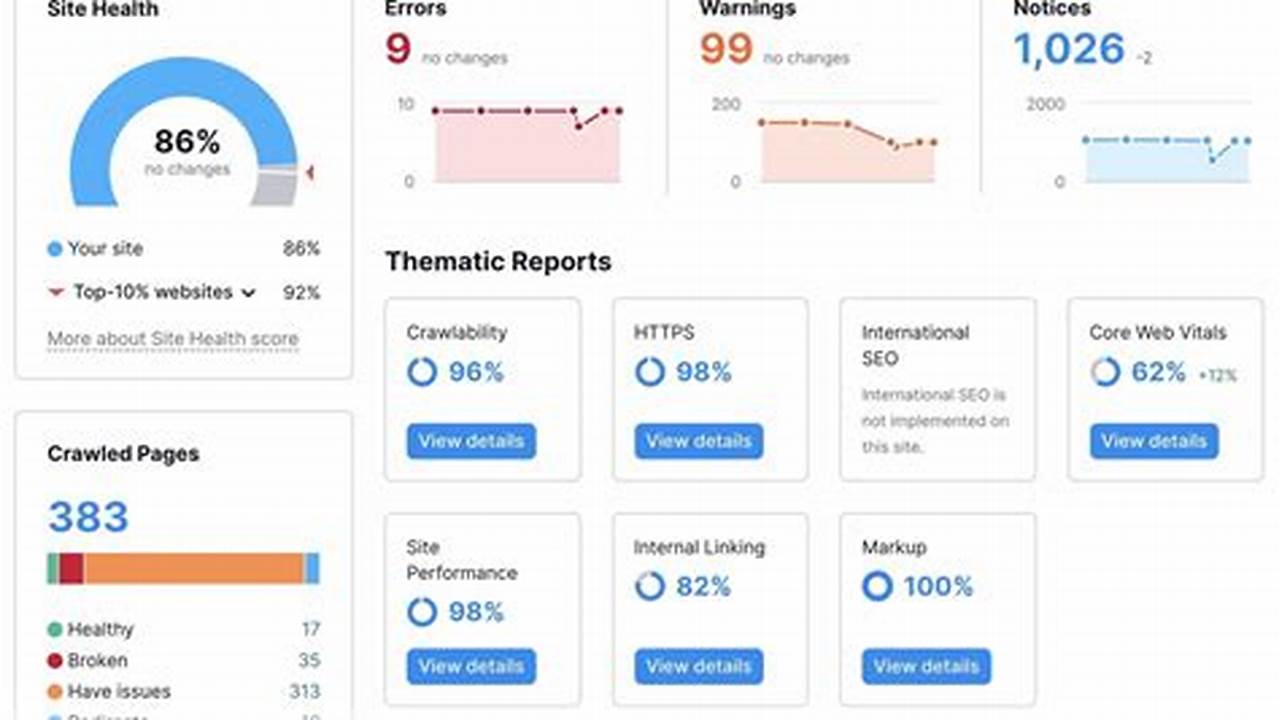Website audits are crucial for maintaining and improving online visibility. They provide valuable insights into technical SEO, content quality, user experience, and competitive landscape. Utilizing the right audit tools can streamline this process, enabling website owners to identify and address critical issues impacting search engine rankings and overall performance. Selecting the appropriate tool, whether free or paid, depends on individual needs and budget. The following explores the importance of site audits and provides guidance for 2024.
Technical SEO Analysis
Comprehensive tools assess crucial elements like crawlability, indexability, site speed, mobile-friendliness, and structured data implementation.
Content Quality Evaluation
Effective audits analyze content for relevance, keyword optimization, readability, originality, and overall quality.
User Experience (UX) Assessment
Tools identify potential UX issues, such as broken links, slow loading times, poor navigation, and mobile responsiveness problems.
Backlink Profile Analysis
Understanding the quantity and quality of backlinks is essential. Audits can reveal toxic links, spammy domains, and opportunities for link building.
Competitive Analysis
Analyzing competitor websites provides insights into their strategies, strengths, and weaknesses, enabling data-driven decision-making.
Keyword Research Integration
Some tools integrate keyword research functionality, allowing users to identify relevant keywords and optimize content accordingly.
Reporting and Analytics
Clear and concise reports provide actionable insights, enabling website owners to track progress and measure the effectiveness of SEO efforts.
Cost-Effectiveness
Choosing between free and paid tools depends on individual needs and budget. Free tools offer basic functionality, while paid options provide more advanced features and support.
Scalability and Customization
As websites grow, audit tools should be able to handle increasing complexity and offer customization options to meet specific requirements.
Integration with Other Tools
Seamless integration with other marketing and analytics platforms streamlines workflows and provides a holistic view of website performance.
Tips for Effective Site Audits
Regularly conduct audits, ideally monthly or quarterly, to identify and address emerging issues promptly.
Prioritize identified issues based on their potential impact on search engine rankings and user experience.
Track progress and measure the effectiveness of implemented changes using analytics data.
Stay updated on the latest SEO best practices and algorithm updates to ensure audits remain relevant and effective.
Frequently Asked Questions
What is the purpose of a website audit?
A website audit helps identify technical issues, content gaps, and UX problems that hinder search engine visibility and user satisfaction.
How often should I conduct a site audit?
Regular audits, typically monthly or quarterly, are recommended to maintain optimal website performance and address emerging issues promptly.
What are the key factors to consider when choosing an audit tool?
Key factors include the scope of features offered, cost-effectiveness, scalability, integration capabilities, and reporting functionality.
Are free audit tools sufficient for small businesses?
Free tools can provide basic insights for small businesses, while paid tools offer more advanced features and support for larger or more complex websites.
What is the difference between on-page and off-page SEO audits?
On-page audits focus on elements within the website, while off-page audits analyze external factors like backlinks and social media presence.
How can I interpret the results of a site audit?
Most tools provide clear reports highlighting key issues and recommendations for improvement. Prioritize issues based on their potential impact.
Effective website audits are essential for achieving and maintaining online success. By leveraging the right tools and strategies, website owners can identify and address critical issues, improve search engine rankings, and enhance the overall user experience. Choosing the right tool, whether free or paid, allows for a tailored approach to website optimization in 2024.

Leave a Reply